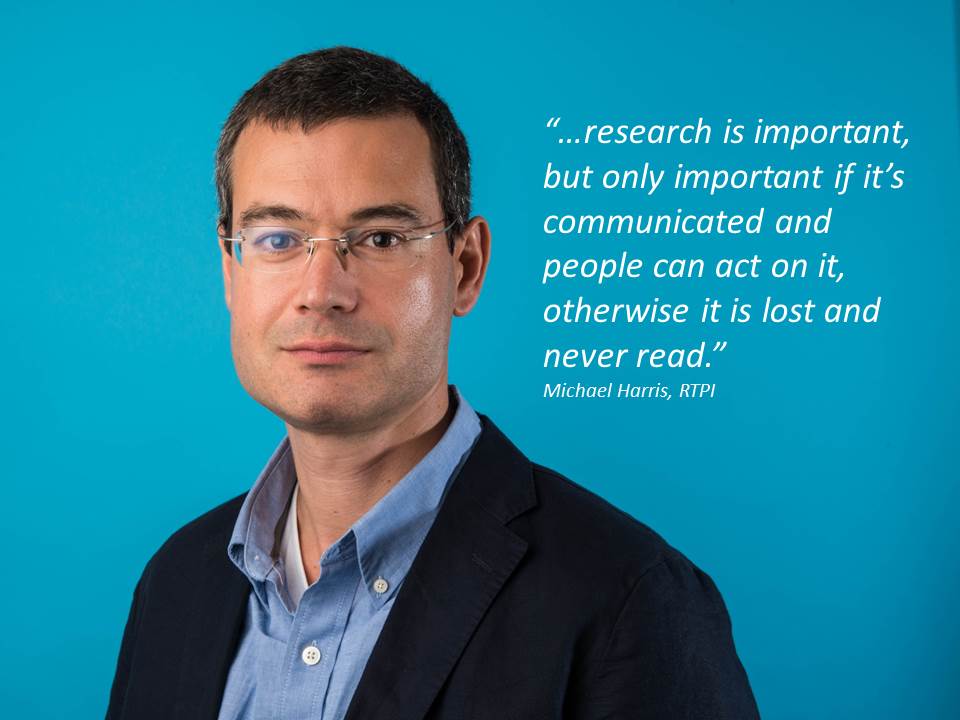 In the latest of our series of Q&As with leading advocates of the use of evidence in policymaking and practice, we talk to Michael Harris, Deputy Head of Research at the Royal Town Planning Institute. The RTPI holds a unique position in relation to planning as a professional membership body, a charity and a learned institute. They have a responsibility to promote the research needs of spatial planning in the UK, Ireland and internationally. They add to the evidence base through in-house research and policy analysis, for example their Policy papers. We interviewed Michael about the research issues facing the planning profession.
In the latest of our series of Q&As with leading advocates of the use of evidence in policymaking and practice, we talk to Michael Harris, Deputy Head of Research at the Royal Town Planning Institute. The RTPI holds a unique position in relation to planning as a professional membership body, a charity and a learned institute. They have a responsibility to promote the research needs of spatial planning in the UK, Ireland and internationally. They add to the evidence base through in-house research and policy analysis, for example their Policy papers. We interviewed Michael about the research issues facing the planning profession.
Michael, how do you think planners benefit from developing their knowledge and use of evidence?
I think all professions need to be evidence based, it’s the core of being a professional, and it enables you to perform your role, not just on a judgement but an expert professional one. This is the first way planners can benefit; keeping on top of what’s the best available evidence ensures you are effective. All professions have innovators, those who get things done and make changes, and learning from them and using their experience through case studies, best practice and collaboration ensures their good practice gets pushed out to the whole profession and that’s the core benefit of using evidence.
The second benefit is getting the bigger picture, ensuring you understand the major economic, social and environmental challenges. Such as how to create growth, achieve sustainable development, and understand the impact of aging and climate change. All these need new thinking, innovation, and cross discipline knowledge – the best way to do this is through evidence and research.
I work with policy makers to inform policy, and I constantly challenge the perception that planners are an inhibitor of growth. Evidence of the impact and the value which planners add to the growth of places, helps me challenge this perception and benefits the profession as a whole.
What are the main issues facing planners in the next 5 years? What evidence will they need?
The main challenges are:
- Resources, having less and less and being asked to do more and more. How do we deal with those demands – evidence and sharing of best practice can play a critical role, we can learn from others, and other professions. How do you move from just evaluating what you do based on efficiency and cutting costs to ensuring effectiveness, and improving the impact and outcome of what you are doing? Evidence can help you stop just thinking about efficiency and also take account of effectiveness.
- Demonstrating the value of planning – we need to make a stronger case for the economic, social and environmental role of planners, and not be characterised as processors. Planners carry out a key role in shaping the world around us, not simply managing a process, and the challenge is to continue to demonstrate this.
- Ensuring local participation and being more strategic, operating across boundaries, especially for issues such as flooding. It’s difficult for planners to act strategically if the political support isn’t there. There needs to be a will there to enable planners to be truly effective. None the less, a key duty of a professional is to promote understanding; the only way we can do this well, is to work more effectively across boundaries.
My sense is that practitioners value examples of where other authorities have achieved more. Where strategic planning has worked and how you can make it work, or where someone has dealt with limited resources or sustainable development. Case studies are a core strand of accessible evidence, but many are buried in academic research or journals and the RTPI / Idox Information Service are really good at finding them and making them easier to access. This need will only grow greater as more and more information is produced.
In terms of data needs for the future, what we are increasingly seeing potential from is “Big Data”, for example we can make connections between health, social mobility and environment. In the next 5 or 10 years we will be able to draw on these big data sets, which will be a very powerful tool for planners in making decisions about places, and having a strategic, holistic approach to development.
When people talk to you about evidence, research or knowledge, what do they most frequently raise as issues?
The big challenge is time – planners haven’t got time to go looking for evidence – and accessibility of research papers, which are buried in academic journals. The academic language is a barrier, and its timeliness. Often it’s interesting to read but doesn’t relate to the current policy context, so research needs to be more timely and more practical and applied. Alongside time, support from their organisations to look at evidence – the access to evidence resources and time or budget to attend CPD is frequently raised as an issue.
Not enough research is accessible; academic incentives aren’t about applicability; it’s driven by the need to be of a high standard, set by other academics and journals. It is possible to do academic work which is useable and there are lots of good examples, but there are barriers for the academic to deal with. There is good academic research which is relevant but it’s difficult to find. There are also issues about the subjects covered and academic’s interest versus policy maker’s priorities – sometimes there are overlaps but often they are very different.
For example Value of Planning is a key policy issue at the moment – what is the economic impact of planning – but academics don’t see this as an issue as they are already positive about planning. They take for granted that planners have an impact, so don’t see the need to investigate the nature and form of that impact.
What are the hard-to-spot mistakes when it comes to developing your knowledge, things you which you really need to avoid?
Two things I would highlight. Given what the constraints are, it’s easy to rely on an old body of evidence, what you were taught when you were being trained, and not keeping it up to date. That’s why Idox Information Service and RTPI research, especially practice notes which are aimed at helping practitioners refresh knowledge and keep up to date, are essential.
There is also a danger of being too narrow, and not looking at wider areas and topics which affect planning. This creates a narrower perspective on development. Briefing services are really helpful to overcome this, looking at a variety of reports and papers – you can look at the areas you are interested in directly, but you can also scan the broader perspective. Planning should be about not thinking in silos, but how does ‘this’ affect ‘that’ – how can people travel to work, access jobs or get outdoors and you need to think about and be exposed to broader ideas to understand these issues.
Thinking ‘economically’ is something we are trying to promote, not just the traditional way, but our argument is that planning is critical to the economic success of places; it can make them more attractive, livelier, sustainable, and environmentally appealing, so it’s the broader contribution to success that is important. Every planning decision contributes to the success of a place.
How do you think people will be doing evidence, research and knowledge development in 5 years’ time?
I would like to see a profession known for its evidence-based practice, with practitioners able to find, and understand, in an accessible way, the latest evidence.
The future should be where academic research is more and more accessible and applicable to practice having a real impact on delivery. Collaboration between practitioners and researchers makes research more relevant. Projects which have come out of these partnerships have real impact and RTPI will be supporting these projects in the future.
If you had a list of ‘best-kept secrets’ about research, evidence and knowledge you would recommend, what would you include and why?
So much stuff out there, how do you find out what’s going on? Social media and twitter is an incredibly useful research tool – following research organisations, following blogs, can be really useful. Knowledge isn’t static any more, and things you read only 5 years ago can be quite out of date now, and planners need to continually keep up to date. The RTPI and Idox blogs are good in terms of wide-ranging coverage and highlighting latest research but there are plenty out there.
What led you to a role in research and evidence development?
I did a PhD in politics and public policy, was always more interested in how you can make research more relevant and of interest to policy makers, but I am also aware of the barriers for academics doing this.
I have always sat in organisations that do this bridging. RTPI, as a learned society is doing this for its members. Research is important, but only important if it’s communicated and people can act on it, otherwise it is lost and never read. I see myself as facilitating its use and contribution to change and improvement in practice.
Academic research being read is vital, but academics need to understand the policy constraints, and the importance of making a compelling argument to change practice and policy today.
The Idox Information Service has introduced an exclusive offer for RTPI members to help them with their evidence needs.
This year Idox is also sponsoring the RTPI Research Excellence Awards, recognising and promoting high quality spatial planning research.
Find out more about our work supporting planners on our website.
Share
Related Posts
With information now so accessible, it’s easy to assume that whenever you have a question you can simply tap it into a search engine. But, while the internet and digital search tools are undoubtedly useful for checking basic facts, when ....
Tackling geographical inequalities is critical for ensuring that all parts of the country have the potential to prosper. When the UK was a member of the European Union, it was entitled to a share of funding from the EU’s structural ....
By Ian Babelon A new-old concept for proximity “Are we there yet?” Parents may patiently nod to their children’s insistent nudges on a 20-minute journey to… somewhere. Quite rightly, researchers have asked: twenty minutes to what? The answer may well ....

